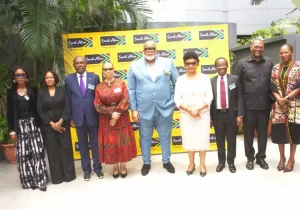The Government of South Africa has reaffirmed its commitment to strengthening economic diplomacy with Nigeria to unlock new trade and investment opportunities that drive growth and development across Africa.
This commitment was declared in Lagos by the Acting High Commissioner and Consul General of South Africa in Nigeria, Bobby Moroe, during the opening session of the 2025 Outward Selling Trade Mission to Nigeria, organised by the South African Consulate General Lagos in collaboration with the Department of Trade, Industry and Competition (DTIC).
In his remarks, Moroe said South Africa and Nigeria, as two of Africa’s largest economies, must work together to enhance trade relations, accelerate industrialisation, and strengthen Africa’s presence on the global economic map. “South Africa and Nigeria have a unique opportunity to strengthen trade and investment ties, driving economic growth and development. Together, let us tap into the transformative power of trade to stimulate growth, generate employment, and enhance lives,” he said.
Highlighting opportunities under the African Continental Free Trade Area (AfCFTA), Moroe added: “Nigeria and South Africa should lead the charge of industrialisation on the continent. By leveraging AfCFTA, we can unlock new avenues for trade and investment, driving growth and job creation.”
Also speaking at the event, Ije Jidenma, the Chairman of the Nigeria-South Africa Chamber of Commerce (NSACC), emphasised the historical and economic bonds between the two countries, urging African nations to view the continent as a shared home. “It behooves on all of us who understand and appreciate the place of these ties in history and our overarching objectives as a continent to continue to knot the ties rather than allow them to be untied, no matter the pressures,” he said.
A major highlight of the trade mission was the Business-to-Business (B2B) matchmaking session. Margaret Chichi Nkire, Founder of McKire Africa, explained that six South African companies from sectors including manufacturing, engineering, mining, agriculture, and agro-processing were successfully matched with Nigerian businesses in corresponding industries.
She noted that the B2B meetings provided more than networking opportunities, offering practical avenues for collaboration that could evolve into distributorships, joint ventures, and long-term partnerships. She added that the meetings aligned with AfCFTA’s objective of expanding intra-African trade, reducing reliance on external markets.
“The active involvement of institutions such as the Nigeria–South Africa Chamber of Commerce (NSACC), members of Stanbic IBTC, the Nigerian Investment Promotion Commission (NIPC), and the Lagos Chamber of Commerce and Industry (LCCI) was critical to building trust and establishing the right structures for sustainable business relationships between both countries,” Nkire said.
“By bringing Nigerian and South African businesses face-to-face, we are laying the groundwork for the kind of integration AfCFTA envisions—an Africa that trades more with itself, reduces dependency on external markets, and grows stronger from within,” she added.
Technology and innovation also featured prominently in the mission. Mr. Sonny Iroche, Chief Executive Officer of GEN AI Learning Concepts Limited, highlighted the role of artificial intelligence (AI) in supporting trade. Speaking on the theme “How South Africa and Nigeria Can Leverage on the Opportunities Presented by AI to Advance Trade,” he said Africa must embrace AI or risk lagging behind globally.
“AI can verify the authenticity of prospective business partners and assess the financial strength of companies. It is both good and bad, depending on who is using it and for what purpose,” Iroche said, stressing that proper application can be transformative.
In his presentation, David Hachilam Nkire, Partner at Fola Sowemimo & Co (Sterling Partners), addressed the ease of doing business in Nigeria.
He reassured South African investors that Nigeria has undertaken regulatory reforms, including streamlined company registration, tax incentives for priority sectors, enhanced dispute resolution mechanisms, and stronger legal frameworks protecting cross-border partnerships.
While acknowledging the challenges every emerging market presents, he emphasised that Nigeria offers one of the most profitable landscapes in Africa. With the right guidance and credible local partners, South African businesses can thrive.
The 2025 Outward Selling Trade Mission to Nigeria showcased the commitment of both nations to deepen economic and cultural ties, strengthen private sector linkages, and use trade as a catalyst for industrial growth.
With government commitment, private sector collaboration, and regulatory support, the mission underscored a shared vision: to make Africa a more integrated, competitive, and prosperous economic powerhouse.
Closing the event, Moroe expressed optimism about the future of South Africa–Nigeria cooperation. “This mission is not just about today’s conversations but about tomorrow’s opportunities. The partnerships we are building here will serve as a model for Africa, showing that when we work together, we can rise together,” he said.
Source: Business Day


